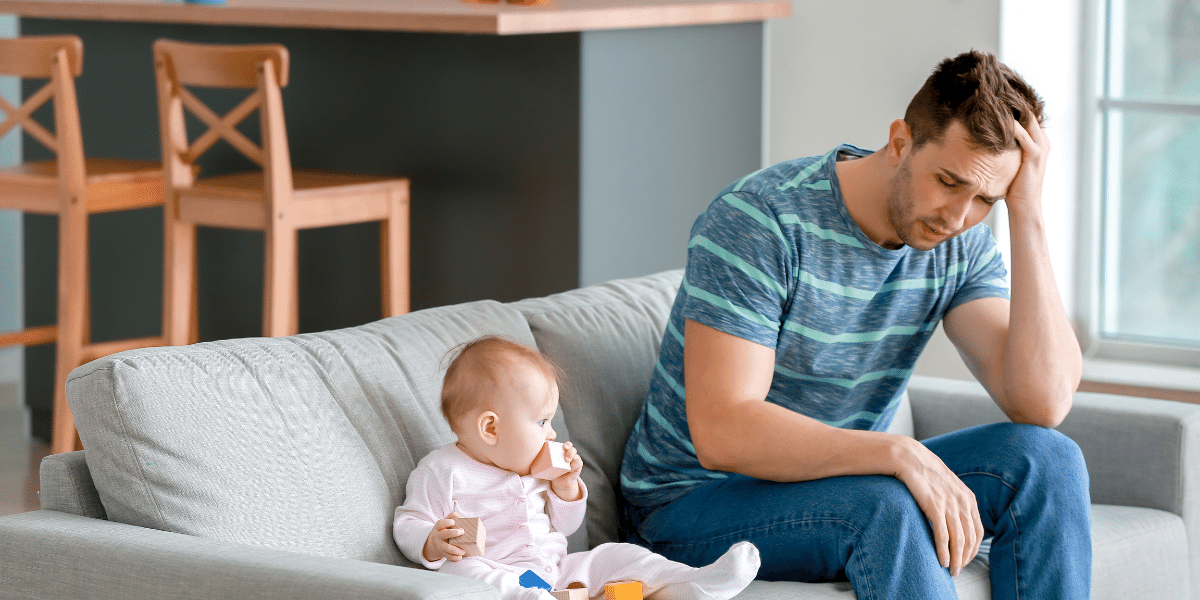Postnatal depression in men: What are the signs, and how can you help?
Pregnancy and early parenting are vulnerable times for both parents’ mental health, which is why it’s routine to ask mums about their mental health. But, postnatal depression in men gets far less attention.
It’s vital to know the signs of postnatal depression in dads, how to protect their mental health, and where to find help.
With the number of dads with postnatal depression being 1 in 10, we owe dads the opportunity to talk about their mental health during pregnancy and in the first year after birth.

Signs of postnatal depression in dads
Depression can show up in a dad’s thoughts, feelings, actions, and body. Physical signs include tiredness, headaches, decreased interest in sex, and appetite changes. Dads can also show irritability, rage, and aggression. If they have anxiety, it can create worries about the baby’s health, development, and safety.
Some fathers use avoidance to manage their complicated feelings. For example, they may focus more on work or hobbies and less on the family. They might also exercise excessively, play video games, or use drugs or alcohol.
How postnatal depression in men affects the family
In the short term, when dad’s mental health suffers, it affects the rest of the family. Likewise, postnatal depression in men impact the mother’s mental health, the parent’s relationship, and the family’s functioning and wellbeing.
Without treatment, a dad’s depression can sometimes influence the child’s development and behaviour in the long term. Not just when a baby, but even at school. The child might show increased crying, hyperactivity, behaviour problems, and social issues.

Good practices that protect against mental health problems
Research identifies many risk factors for mental health difficulties during pregnancy and parenthood. Some of these we can’t change, but some we can.
Expectant dads might be able to set themselves up for more robust mental wellbeing by:
- preparing for fatherhood
- learning more about pregnancy, birth, and parenting (through books and classes)
- strengthening the couple’s relationship before the baby arrives
- Resolving stressful life issues before or during pregnancy, for example, work (with the advice of professionals as needed)
- exercising several times a week
- spending more time with supportive friends and developing a social network
- improving their relationship with their parents
- taking steps before the birth, where possible, to reduce financial stress
- lining up practical help from family and friends.
Making it normal to talk about mental health
Traditionally, men are discouraged from looking weak or vulnerable, so fathers are probably less likely than mothers to ask for help for depression. Making it normal for men to talk to their GP about their mental health is essential.
As a community, one of the best things we can do for new dads is to raise awareness that postnatal depression in men is relatively common. And talk about how vital it is for dad to look after his mental health.
What to do when you see signs of postnatal depression in a dad
We can also help new dads by simply asking them how they’re doing. In research interviews, some fathers said that no one asked them how well they were adjusting to parenthood. But they did ask the mothers.
Anyone noticing signs of postnatal depression in a dad should encourage them to act early. If their mental health has been poor for more than two weeks, they need to book in with their doctor. (Of course, if the dad has been experiencing suicidal thoughts, it means they need to seek immediate help.)
One of the treatments that usually works well for postnatal depression in men is cognitive behavioural therapy. It involves challenging unhelpful thoughts, managing emotions, and developing healthy coping strategies.
As well as your GP, several organisations can help:
- Perinatal Anxiety and Depression Australia (PANDA), 1300 726 306, [email protected]
- MensLine Australia, 1300 789 978 (for family or relationship concerns)
- Parentline,1300 30 1300 (to discuss any issue that affects you as a parent)
- BeyondBlue,1300 224 636 (for information and advice on depression.)
It’s helpful to remember that a parent who gets help is doing the right thing for their family – it’s not a sign of weakness.
Reference List
PBB aims to keep you informed with the latest research-based information. Check out our reference list used in the creation of this article.
Published 5th April 2022
About the Author
Louise Wedgwood is a freelance health and parenting writer, working with magazines, online publications and businesses. She has a background in health science, and enjoys helping parents make evidence-based choices. Her own children have shown her making the right decisions is never black-and-white.
Share this Post
Recent Posts
Recent Comments
- Jane Palmer on Wagga Wagga Base Hospital
- Kiera Fenn-Lavington on Wagga Wagga Base Hospital
- Jane Palmer on How to use your breast milk donation to help other mums and unwell bubs
- Miss Z on Tien’s Story
- Jane Palmer on Fifteen with Twins
Archives
Categories
PBB’s Social Media Pages
The post Postnatal depression in men: What are the signs, and how can you help? appeared first on Pregnancy Birth and Beyond.
Read Original Article: Postnatal depression in men: What are the signs, and how can you help? »




